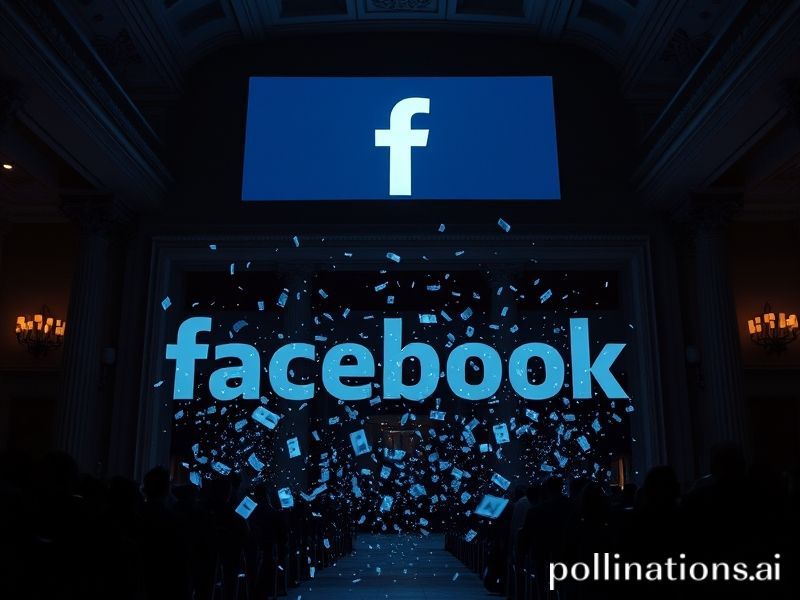facebook privacy settlement
MADRID—Somewhere in Silicon Valley, a bean-bag chair the size of Liechtenstein has just exhaled in relief. Facebook—sorry, Meta—has agreed to pay a modest €1.2 billion (roughly what Mark Zuckerberg spends annually on SPF 50) to settle a European privacy case that began when a law student in Vienna asked, in 2018, “Hey, what exactly do you people do with my data?” Five years, three continents, and approximately 4.7 million privacy-policy pop-ups later, the answer turns out to be: “We sell it, obviously, but here’s a coupon for 10 percent off Oculus accessories.”
The fine, imposed by Ireland’s Data Protection Commission under the EU’s GDPR, is the largest ever levied under the regulation and the second-largest in global tech history—trailing only the time Amazon coughed up €746 million for similar sins, proving the Continent’s talent for turning moral outrage into hard currency. Yet in the grand ledger of Meta, €1.2 billion is petty cash, the corporate equivalent of fishing around under the sofa cushions for bus fare. Investors barely flinched; the share price dipped, then rebounded faster than a conspiracy theory on Aunt Karen’s timeline. Somewhere, an algorithm wearing a Patagonia vest updated its risk model and moved on to lunch.
From Singapore to São Paulo, the settlement is being parsed like Kremlin tea leaves. For regulators outside Europe, the message is as subtle as a push-notification at 3 a.m.: write tougher laws, hire more lawyers, and—crucially—get yourself an Irish subsidiary. Brussels may style itself the world’s data conscience, but its real superpower is the ability to fine American firms in a currency stronger than the dollar while still accepting their lobbyists’ dinner invitations. Meanwhile, countries with less clout watch the spectacle the way the rest of us watch billionaires race submarines: equal parts envy and schadenfreude.
In India, where 400 million WhatsApp users routinely forward goat-medicine memes with the urgency of nuclear launch codes, activists greeted the fine with weary applause. “It’s a start,” said Nikhil Pahwa, digital-rights gadfly, between sips of over-brewed conference coffee. “But until the money actually reaches the people whose intimacies were bartered like Pokémon cards, it’s just another line item.” In Nigeria, where Facebook’s Free Basics once promised “the internet” but delivered a diet of Facebook, regulators are debating whether to demand their own slice of the shaming pie. Lagos-based lawyer Amaka Okafor put it more bluntly: “If Europe can tax colonial guilt, surely we can invoice digital neo-colonialism.”
The broader significance, however, lies less in the check than in the choreography. Meta’s contrite press release—written in the passive voice so aggressively it could win a Latin grammar prize—pledged to “review data-transfer mechanisms” and “continue constructive dialogue.” Translation: we’ll route your vacation photos through a different legal fiction until the next court says that fiction is also fiction. Europe, for its part, gets to wave the GDPR like a medieval banner, reminding smaller nations that privacy is a luxury brand, and discounts are available for friends.
Human nature, ever the optimist, will interpret the settlement as progress. After all, someone somewhere paid something, which is more than can be said for the 2010s, when our data was vacuumed up like free peanuts. Yet the real punchline is global: we have built an economy where the most intimate details of our lives—our late-night heartbreaks, our secret fascinations with sourdough—are the raw material, and we are comforted by the illusion that every few years a regulator will demand a receipt. Meanwhile, the same users who howled about privacy will click “Accept All” tomorrow morning because the cookie banner is blocking their recipe for gluten-free brownies.
So, dear reader, whether you’re scrolling in Stockholm or swiping in Surabaya, enjoy your symbolic victory. The fine has been paid, the outrage archived, and the machinery of surveillance capitalism has already scheduled its next software update. In the end, the only thing truly transferred across borders is the certainty that the next scandal will be bigger, the apology more fluent, and the fine—adjusted for inflation—still just the cost of doing business.







